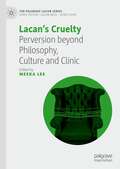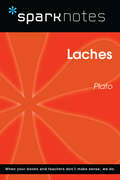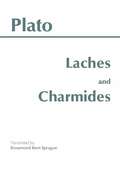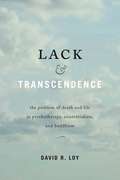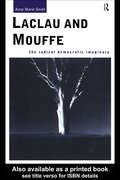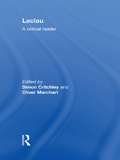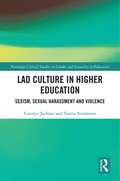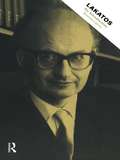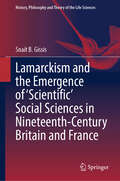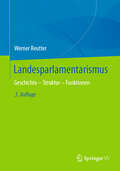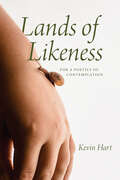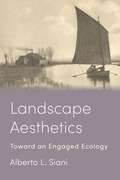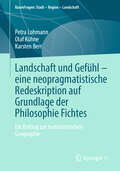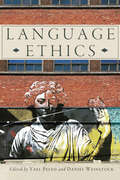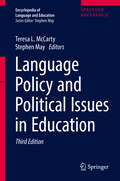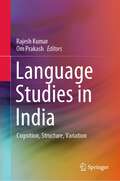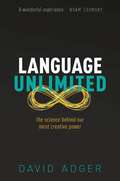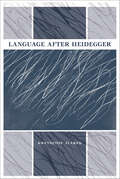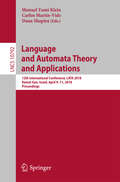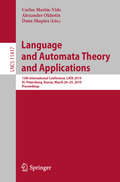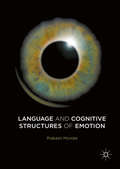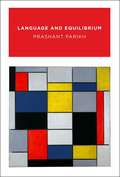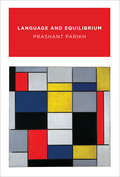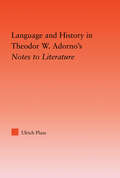- Table View
- List View
Lacan’s Cruelty: Perversion beyond Philosophy, Culture and Clinic (The Palgrave Lacan Series)
by Meera LeeThis collection, written by leading Lacanian psychoanalytic theorists and practitioners, is a unique exploration of the novel aspects of perversion from the perspective of cruelty—a psychoanalytic study that has never been sufficiently undertaken in an English-speaking world. Instead of reducing the notion of perversion to cultural representations, a historical discourse or a clinical diagnosis, the authors in this collection draw on Freud, Kant, Hegel, Marquis de Sade, Derrida, Deleuze and Žižek to untie the knot of “psychic cruelty” intrinsic to perversion and therefore “de-sexualize” perverted acts. They do so by theorizing perversion in psychoanalytic concepts of the Oedipus complex, the-Name-of-the-Father and jouissance, and furthermore in the perspective of the clinics of neurosis and psychosis, in dialogue with a clinical praxis, philosophy and literature.
Laches (SparkNotes Philosophy Guide)
by SparkNotesLaches (SparkNotes Philosophy Guide) Making the reading experience fun! SparkNotes Philosophy Guides are one-stop guides to the great works of philosophy–masterpieces that stand at the foundations of Western thought. Inside each Philosophy Guide you&’ll find insightful overviews of great philosophical works of the Western world.
Laches and Charmides
by Plato Rosamond Kent SpragueRosamond Kent Sprague's translations of the Laches and Charmides are highly regarded, and relied on, for their lucidity and philosophical acuity. This edition includes notes by Sprague and an updated bibliography.
Lack & Transcendence: The Problem of Death and Life in Psychotherapy, Existentialism, and Buddhism
by David R. LoyLoy draws from giants of psychotherapy and existentialism, from Nietzsche to Kierkegaard to Sartre, to explore the fundamental issues of life, death, and what motivates us.Whatever the differences in their methods and goals, psychotherapy, existentialism, and Buddhism are all concerned with the same fundamental issues of life and death—and death-in-life. In Lack and Transcendence (originally published by Humanities Press in 1996), David R. Loy brings all three traditions together, casting new light on each. Written in clear, jargon-free style that does not assume prior familiarity, this book will appeal to a wide variety of readers including psychotherapists and psychoanalysts, scholars of religion, Continental philosophers, and readers seeking clarity on the Great Matter itself. Loy draws from giants of psychotherapy, particularly Freud, Rollo May, Irvin Yalom, and Otto Rank; great existentialist thinkers, particularly Nietzsche, Kierkegaard, Heidegger, and Sartre; and the teachings Buddhism, particularly as interpreted by Nagarjuna, Huineng and Dogen. This is the definitive edition of Loy’s seminal classic.
Lack of Character
by John M. DorisThis book is a provocative contribution to contemporary ethical theory challenging foundational conceptions of character that date back to Aristotle. John Doris draws on behavioral science, especially social psychology, to argue that we misattribute the causes of behavior to personality traits and other fixed aspects of character rather than to the situational context. More often than not it is the situation not the nature of the personality that really counts. The author elaborates the philosophical consequences of this research for a whole array of ethical theories and shows that, once rid of the misleading conception of motivation, moral psychology can support more robust ethical theories and more humane ethical practices.
Laclau and Mouffe: The Radical Democratic Imaginary
by Anna Marie SmithLaclau and Mouffe: The Radical Democratic Imaginary is the first full-length overview of the important work of Ernesto Laclau and Chantal Mouffe. Anna Marie Smith clearly shows how Laclau and Mouffe's work has brought Gramscian, poststructuralist and psychoanalytic perspectives to revitalize traditional political theory. With clarity and insight, she shows how they have constructed a highly effective theory of identity formation and power relations that carefully draws from the criticism of political theory from postmodern anti-foundationalist political theory.
Laclau: A Critical Reader
by Simon Critchley Oliver MarchartLaclau: A Critical Reader is the first full-length critical appraisal of Laclau's work and includes contributions from several leading philosophers and theorists. The first section examines Laclau's theory that the contest between universalism and particularism provides much of the philosophical background to political and social struggle, taking up the important place accorded to, amongst others, Hegel and Lacan in Laclau's work. The second section of the book considers what Laclau's 'radical democracy' might look like and reflects on its ethical implications, particularly in relation to Laclau's post-Marxism and thinkers such as Jürgen Habermas. The final section investigates the place of hegemony in Laclau's work, the idea for which he is perhaps best-known.This stimulating collection also includes replies to his critics by Laclau and the important exchange between Laclau and Judith Butler on equality, making it an excellent companion to Laclau's work and essential reading for students of political and social theory.
Lad Culture in Higher Education: Sexism, Sexual Harassment and Violence (Routledge Critical Studies in Gender and Sexuality in Education)
by Vanita Sundaram Carolyn JacksonResponding to increasing concerns about the harmful effects of so-called ‘lad culture’ in British universities, and related ‘bro’ and ‘frat’ cultures in US colleges, this book is the first to explore and analyse the perspectives of university staff on these cultures, which students suggest foster the normalisation of sexism, homophobia, racism, sexual harassment and violence. Drawing on in-depth interviews with a broad range of staff and faculty across different types of universities in England, the book explores the following key questions: What is lad culture? How and where is it manifest in higher education and what are the effects on students and staff? How can ‘laddish’ behaviour be explained? How can we theorise lad culture to enable us to better understand and challenge it? How do dynamics in the United Kingdom compare to so-called ‘bro’ and ‘frat’ cultures in US colleges? By examining the ways in which lad culture is understood and explained, the authors illustrate that current understandings of lad culture obscure the broader processes through which problematic attitudes, practices, and educational climates are fostered. This analysis enables a theorisation of lad culture that makes visible the gendered norms and intersecting structural inequalities that underpin it. This timely and accessible volume will be of great interest to anyone looking to understand and tackle sexism, sexual harassment and violence in and beyond university contexts. It will be of particular significance to researchers, undergraduate and postgraduate students, academics, and policy makers in the fields of gender and sexuality in education, higher education, and sociology of education.
Lakatos: An Introduction
by Brendan LarvorLakatos: An Introduction provides a thorough overview of both Lakatos's thought and his place in twentieth century philosophy. It is an essential and insightful read for students and anyone interested in the philosophy of science.
Lamarckism and the Emergence of 'Scientific' Social Sciences in Nineteenth-Century Britain and France (History, Philosophy and Theory of the Life Sciences #36)
by Snait B. GissisThe book presents an original synthesizing framework on the relations between ‘the biological’ and ‘the social’. Within these relations, the late nineteenth-century emergence of social sciences aspiring to be constituted as autonomous, as 'scientific' disciplines, is described, analyzed and explained. Through this framework, the author points to conceptual and constructive commonalities conjoining significant founding figures – Lamarck, Spencer, Hughlings Jackson, Ribot, Durkheim, Freud – who were not grouped nor analyzed in this manner before. Thus, the book offers a rather unique synthesis of the interactions of the social, the mental, and the evolutionary biological – Spencerian Lamarckism and/or Neo-Lamarckism – crystallizing into novel fields. It adds substantially to the understanding of the complexities of evolutionary debates during the last quarter of the nineteenth century. It will attract the attention of a wide spectrum of specialists, academics, and postgraduates in European history of the nineteenth century, history and philosophy of science, and history of biology and of the social sciences, including psychology.
Landesparlamentarismus: Geschichte - Struktur - Funktionen
by Werner ReutterDieser Band bietet eine Bestandsaufnahme der Funktionsweisen, der Aufgaben und der Stellung der Landesparlamente in den einzelnen Bundesländern. Er informiert über die historische Entwicklung und verfassungsrechtlichen Voraussetzungen der 16 Landesparlamente, stellt die jeweiligen Parteienlandschaften, das Wahlrecht und die Wahlergebnisse vor, analysiert die politische und soziale Zusammensetzung sowie die Struktur und Organisation der Landesparlamente und untersucht schließlich den Funktionswandel dieser Institutionen. Für die 3. Auflage wurde er umfassend aktualisiert und erweitert.
Lands of Likeness: For a Poetics of Contemplation
by Kevin HartAn original and profound exploration of contemplation from philosopher, theologian, and poet Kevin Hart. In Lands of Likeness, Kevin Hart develops a new hermeneutics of contemplation through a meditation on Christian thought and secular philosophy. Drawing on Kant, Schopenhauer, Coleridge, and Husserl, Hart first charts the emergence of contemplation in and beyond the Romantic era. Next, Hart shows this hermeneutic at work in poetry by Gerard Manley Hopkins, Marianne Moore, Wallace Stevens, and others. Delivered in its original form as the prestigious Gifford Lectures, Lands of Likeness is a revelatory meditation on contemplation for the modern world.
Landscape Aesthetics: Toward an Engaged Ecology
by Alberto L. SianiThe notion of landscape typically seems innocuous, associated with leisure and contemplation. Likewise, aesthetics is often seen as apolitical, a matter of subjective tastes and preferences. This book challenges the common understanding of these categories as disengaged and demonstrates how uniting landscape studies and philosophical aesthetics opens new ways of addressing both the environmental crisis and the crisis of the humanities.Alberto L. Siani argues that the concept of landscape helps us overcome deeply ingrained oppositions, such as nature and culture, spirit and flesh, or the environment and the human. Landscape represents the intersection of these categories and therefore provides a helpful vantage point on contemporary predicaments that cannot be understood within dualistic frameworks. An engaged aesthetics shows that landscapes are not simply ways of seeing the world but ways of being in the world, offering practical guidance for inhabiting places ethically. Landscape Aesthetics sheds new light on issues spanning art and its interpretation, environmentalism, temporality, lived spaces, justice, education, and interdisciplinarity. Bringing together a wide range of sources across philosophy and other disciplines as well as personal experience, Siani reveals the key role of landscape and aesthetics in responding to the pressing crises we face today.
Landschaft und Gefühl – eine neopragmatistische Redeskription auf Grundlage der Philosophie Fichtes: Ein Beitrag zur humanistischen Geographie (RaumFragen: Stadt – Region – Landschaft)
by Olaf Kühne Karsten Berr Petra LohmannDie Befassung mit ‚Landschaft‘ hat in den letzten Jahren in der Öffentlichkeit und den Wissenschaften an Bedeutung gewonnen. In Philosophie, Humangeographie und Sozialwissenschaften haben sich unterschiedliche Traditionen im Umgang mit ‚Landschaft‘ entwickelt. Diese werden in dem vorliegenden Buch hinsichtlich ihrer Tauglichkeit für einen Beitrag zur Analyse und Regelung von Landschaftskonflikten und daraufhin untersucht, Antworten auf die landschaftsbezogenen Herausforderungen der Gegenwart sowohl in Bezug auf Wissenschaft als auch Gesellschaft zu leisten. Zentraler Ansatzpunkt ist die Erörterung des Selbstverhältnisses des Individuums im Konflikt, die im Rückgriff auf Fichtes Theorie des Gefühls im Rahmen einer Philosophie des Subjekts erfolgt. Mit dieser Theorie soll insbesondere die Einseitigkeit wissenschaftlicher Zugänge zum Individuum angegangen werden, die einerseits in der überproportionalen Betonung der Ratio und andererseits in der fehlenden Verortung des Gefühls zuallererst im Individuum selbst besteht. Die mangelnde Beachtung der Binnenperspektive des Individuums im Konflikt führt zu einer Bedeutungsferne des Konflikts für das Individuum sowie infolgedessen zur Verunklarung der konfliktären Situation und damit letztlich Unfähigkeit sinnvollen Handelns bezogen auf die Regelung eines solchen Konflikts. Mit diesem Zugang erweitern wir den sich aktuell in Entwicklung befindlichen neopragmatistischen Ansatz der Landschaftsforschung und stellen die Bedeutung eines humanistischen Ansatzes zu Landschaft heraus, der den Menschen als fühlendes und sittliches Wesen in das Zentrum der Überlegungen stellt. Damit leistet das Buch einen Beitrag zur Redeskription der humanistischen Geographie.
Language Ethics
by Yael Peled and Daniel M. WeinstockLanguage is central to political philosophy, yet until now there has been little in the way of a common framework capable of bridging disciplines that share an interest in language, power, and ethics. Studies are predominantly carried out in isolated disciplinary silos - notably linguistics, philosophy, political science, public administration, and education. This volume proposes a new vision for understanding the political ethics of language, particularly in linguistically diverse societies, and it establishes the necessary common framework for this field of inquiry: language ethics. Through creative and constructive thinking, Language Ethics considers how to advance our understanding of the human commonalities of moral and linguistic capacities and the challenge of linguistic difference and societal interdependence. The book embraces the longstanding centrality of language to moral reasoning and reinterprets it in a manner that draws on the social and political life of real-world inter- and intralinguistic issues. Contributors to this collection are leading international experts from different disciplines and approaches whose voices add diverse insight to the discourse on ethics and language justice. Exploring social, political, and economic realities, Language Ethics illuminates the complex nexus between ethics and language and highlights the contemporary challenges facing multilingual societies, including the uncertainties, ambiguities, anxieties, and hopes that accompany them.
Language Policy and Political Issues in Education
by Teresa L. Mccarty Stephen MayLanguage has too often been studied in isolation from the social and political conditions in which it is used. The late David Corson, the General Editor of the first edition of the Encyclopedia of Language and Education, held the position that an acute understanding of theory was a necessary prerequisite for action, not an alternative to it, especially if one were hoping to change policies for the better. The contributions in this volume acknowledge the centrality of the politics of language, highlighting the importance of the social and political contexts of language policy and language education. This is one of ten volumes of the Encyclopedia of Language and Education. The Encyclopedia bears testimony to the dynamism and evolution of the language and education field, as it confronts the ever-burgeoning and irrepressible linguistic diversity and ongoing pressures and expectations placed on education around the world.
Language Studies in India: Cognition, Structure, Variation
by Rajesh Kumar Om PrakashThis book addresses a wide range of aspects of the study of language in a variety of domains such as cognition, change, acquisition, structure, philosophy, politics, and education. It offers a renewed discussion on normative understanding of these concepts and opens up avenues for a fresh look at these concepts. Each contribution in this book captures a wide range of perspectives and underlines the vigorous role of language, which happens to be central to the arguments contained therein. The uniqueness of this book lies in the fact that it presents simplified perspective on various complex aspects of language. It addresses a wide range of audiences, who do not necessarily need to have a technical background in linguistics. It focuses on complex relations between language and cognition, politics, education to name a few with reference to cognition, change, and acquisition. This book is for researchers with an interest in the field of language studies, applied linguistics, and socio-linguistics.
Language Unlimited: The Science Behind Our Most Creative Power
by David AdgerAll humans, but no other species, have the capacity to create and understand language. It provides structure to our thoughts, allowing us to plan, communicate, and create new ideas, without limit. Yet we have only finite experiences, and our languages have finite stores of words. Where does our linguistic creativity come from? How does the endless scope of language emerge from our limited selves? Drawing on research from neuroscience, psychology, and linguistics, David Adger takes the reader on a journey to the hidden structure behind all we say (or sign) and understand. Along the way you'll meet children who created language out of almost nothing, and find out how new languages emerge using structures found in languages spoken continents away. David Adger will show you how the more than 7000 languages in the world appear to obey the same deep scientific laws, how to invent a language that breaks these, and how our brains go crazy when we try to learn languages that just aren't possible. You'll discover why rats are better than we are at picking up certain language patterns, why apes are far worse at others, and how artificial intelligences, such as those behind Alexa and Siri, understand language in a very un-human way. This book explores the many mysteries about our capacity for language and reveals the source of its endless creativity.
Language after Heidegger (Studies in Continental Thought)
by Krzysztof ZiarekWorking from newly available texts in Heidegger's Complete Works, Krzysztof Ziarek presents Heidegger at his most radical and demonstrates how the thinker's daring use of language is an integral part of his philosophical expression. Ziarek emphasizes the liberating potential of language as an event that discloses being and amplifies Heidegger's call for a transformative approach to poetry, power, and ultimately, philosophy.
Language and Automata Theory and Applications: 12th International Conference, Lata 2018, Ramat Gan, Israel, April 9-11, 2018, Proceedings (Lecture Notes in Computer Science #10792)
by Shmuel Tomi Klein Carlos Martín-Vide Dana ShapiraThis book constitutes the refereed proceedings of the 12th International Conference on Language and Automata Theory and Applications, LATA 2018, held in Ramat Gan, Israel, in April 2018.The 20 revised full papers presented together with 3 invited papers were carefully reviewed and selected from 58 submissions. The papers cover fields like algebraic language theory, algorithms for semi-structured data mining, algorithms on automata and words, automata and logic, automata for system analysis and programme verification, automata networks, automatic structures, codes, combinatorics on words, computational complexity, concurrency and Petri nets, data and image compression, descriptional complexity, foundations of finite state technology, foundations of XML, grammars (Chomsky hierarchy, contextual, unification, categorial, etc.), grammatical inference and algorithmic learning, graphs and graph transformation, language varieties and semigroups, language-based cryptography, mathematical and logical foundations of programming methodologies, parallel and regulated rewriting, parsing, patterns, power series, string processing algorithms, symbolic dynamics, term rewriting, transducers, trees, tree languages and tree automata, and weighted automata.
Language and Automata Theory and Applications: 13th International Conference, LATA 2019, St. Petersburg, Russia, March 26-29, 2019, Proceedings (Lecture Notes in Computer Science #11417)
by Carlos Martín-Vide Alexander Okhotin Dana ShapiraThis book constitutes the refereed proceedings of the 13th International Conference on Language and Automata Theory and Applications, LATA 2019, held in St. Petersburg, Russia, in March 2019. The 31 revised full papers presented together with 5 invited talks were carefully reviewed and selected from 98 submissions. The papers cover the following topics: Automata; Complexity; Grammars; Languages; Graphs, trees and rewriting; and Words and codes.
Language and Cognitive Structures of Emotion
by Prakash MondalThis book examines linguistic expressions of emotion in intensional contexts and offers a formally elegant account of the relationship between language and emotion. The author presents a compelling case for the view that there exist, contrary to popular belief, logical universals at the intersection of language and emotive content. This book shows that emotive structures in the mind that are widely assumed to be not only subjectively or socio-culturally variable but also irrelevant to a general theory of cognition offer an unusually suitable ground for a formal theory of emotive representations, allowing for surprising logical and cognitive consequences for a theory of cognition. Challenging mainstream assumptions in cognitive science and in linguistics, this book will appeal to linguists, philosophers of the mind, linguistic anthropologists, psychologists and cognitive scientists of all persuasions.
Language and Equilibrium
by Prashant ParikhIn Language and Equilibrium, Prashant Parikh offers a new account of meaning for natural language. He argues that equilibrium, or balance among multiple interacting forces, is a key attribute of language and meaning and shows how to derive the meaning of an utterance from first principles by modeling it as a system of interdependent games. His account results in a novel view of semantics and pragmatics and describes how both may be integrated with syntax. It considers many aspects of meaning--including literal meaning and implicature--and advances a detailed theory of definite descriptions as an application of the framework. Language and Equilibrium is intended for a wide readership in the cognitive sciences, including philosophers, linguists, and artificial intelligence researchers as well as neuroscientists, psychologists, and economists interested in language and communication.
Language and Equilibrium
by Prashant ParikhA new framework that shows how to derive the meaning of an utterance from first principles by modeling it as a system of interdependent games. In Language and Equilibrium, Prashant Parikh offers a new account of meaning for natural language. He argues that equilibrium, or balance among multiple interacting forces, is a key attribute of language and meaning and shows how to derive the meaning of an utterance from first principles by modeling it as a system of interdependent games.His account results in a novel view of semantics and pragmatics and describes how both may be integrated with syntax. It considers many aspects of meaning—including literal meaning and implicature—and advances a detailed theory of definite descriptions as an application of the framework. Language and Equilibrium is intended for a wide readership in the cognitive sciences, including philosophers, linguists, and artificial intelligence researchers as well as neuroscientists, psychologists, and economists interested in language and communication.
Language and History in Adorno's Notes to Literature (Studies In Philosophy Ser.)
by Ulrich PlassLanguage and History in Theodor W. Adorno's Notes to Literature explores Adorno’s essays on literature as an independent contribution to his aesthetics with an emphasis on his theory and practice of literary interpretation. Essential to Adorno’s essays is his unorthodox treatment of language and history and his elaboration of the links between the two. One of Adorno’s major but often-neglected claims is that truth is relative to its historical medium, language. Adorno persistently and creatively tries to narrow the gulf between truth and expression, philosophy and rhetoric, and his essays on literature are practical examples of his effort to critically rescue the rhetorical dimension of philosophy. Rather than relying exclusively on aesthetic concepts inherited from his predecessors in the Western tradition (Kant, Hegel, Nietzsche, Kierkegaard), Adorno’s essays seek to transgress and transcend the conceptual limitations of aesthetic discourse by appropriating a non-conceptual, metaphorical vocabulary borrowed from the literary texts he investigates. Thus, Adorno’s interpretations of literature mobilize an alternative subterranean, primarily essayistic and fragmentary discourse on language and history that eludes the categories that tend to predominate his thinking in his major work, Aesthetic Theory. This book puts forth the claim that Adorno’s essays on literature are of central relevance for an understanding of his aesthetics because they challenge the conceptual limitations of philosophical discourse.
